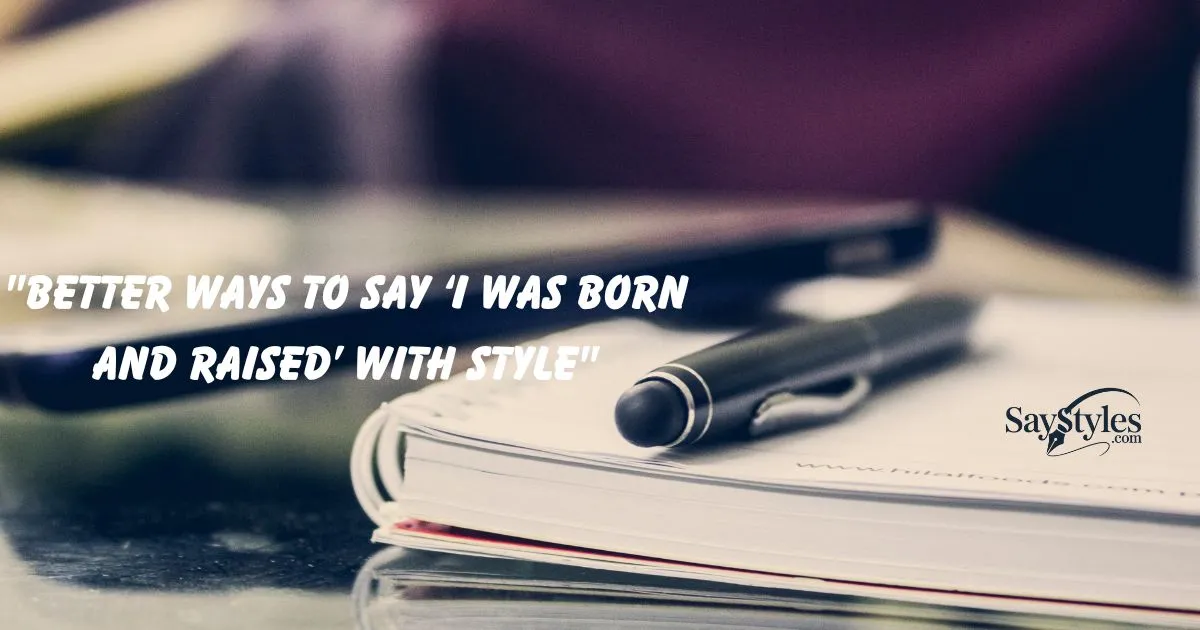“I was born and raised” is a phrase that tells your whole story in just five words.
I’ve used it countless times, but let’s be honest it can start to feel a little plain. When you want to share where you come from with a bit more style and personality, you need fresh ways to say it. After all, your roots are more than just geography, they’re the heartbeat of who you are.
I’m here, not just to list alternatives, but to share ideas that feel natural, real, and a little more you. Think of it as giving your story a fresh coat of paint still true, but more vivid and memorable. Whether it’s for a casual chat, a dating profile, or a professional bio, there’s a better way to express your beginnings.
In this article, you’ll find better ways to say “I was born and raised” that sound engaging, original, and full of life perfect for when you want your words to stand out.
What “I Was Born and Raised” Really Means
“I was born and raised” is a phrase used to talk about someone’s origin or background. It tells where a person was born and grew up. People often use it to share identity, roots, or hometown pride. In conversations, it sounds natural and personal.
List of Say ‘I Was Born and Raised’
• I grew up in…
• I’m originally from…
• I was raised in…
• I spent my early years in…
• I’m a local from…
• My birthplace is…
• I’m homegrown from…
• I spent my youth in…
• I trace my roots back to…
• My heritage is from…
• I grew up near…
• I’m from a small town in…
• I was born and bred in…
• I’ve got my beginnings in…
• I started life in…
• My background is in…
• I grew up around…
• I’m from the city of…
• I hail from the town of…
• I was nurtured in…
• I’ve spent most of my life in…
• I’m a product of…
• I spent my childhood in…
• I’m from the neighborhood of…
• I grew up in the region of…
• I’m rooted in…
• My upbringing was in…
• I come from the town of…
• I’m a native of…
• I spent my formative years in the city of…
1. “I grew up in…”
Story: Alex met Mia at a conference and wanted to share a bit of personal background.
When to Use: When telling someone about the place you spent most of your childhood.
When Not to Use: If you’re avoiding personal details in a casual or professional setting.
Example:
Mia: “So where are you from?”
Alex: “I grew up in Chicago.”
How to Respond 🗣️:
Say, “Really? I’ve always wanted to visit there!”
2. “I’m originally from…”
Story: During a road trip, Sam told his new friends about his hometown.
When to Use: When you want to mention where you were born or first lived.
When Not to Use: If the person already knows your full background.
Example:
Liam: “You don’t sound local. Where’s home?”
Sam: “I’m originally from Denver.”
How to Respond 🗣️:
Say, “Ah, that explains your mountain stories!”
3. “I was raised in…”
Story: At a reunion, Clara explained to her classmates where she grew up.
When to Use: When highlighting where most of your childhood upbringing happened.
When Not to Use: If you want to focus on your current residence instead.
Example:
Jordan: “So where did you grow up?”
Clara: “I was raised in Boston.”
How to Respond 🗣️:
Say, “Boston? It must’ve been a fun place to live!”
4. “I spent my early years in…”
Story: While sharing life stories over coffee, Nick talked about his first home.
When to Use: When explaining where you lived in the very beginning of your life.
When Not to Use: If you don’t want to sound too formal in casual conversation.
Example:
Olivia: “Have you always lived here?”
Nick: “No, I spent my early years in Florida.”
How to Respond 🗣️:
Say, “That must’ve been sunny and warm!”
5. “I’m a local from…”
Story: During a hiking trip, Sarah mentioned her hometown to fellow hikers.
When to Use: When you want to emphasize you’re from the area you’re currently in.
When Not to Use: If you’ve moved away and haven’t lived there for a long time.
Example:
Ethan: “You seem to know these trails well.”
Sarah: “I’m a local from Asheville.”
How to Respond 🗣️:
Say, “No wonder you know all the hidden spots!”
6. “My birthplace is…”
Story: Daniel was chatting with new coworkers, and they started sharing where they’re from.
When to Use: When you want to politely share your origins in a formal or casual conversation.
When Not to Use: If you’re in a fast-paced intro where brevity is better.
Example:
Coworker: “Where are you from?”
Daniel: “My birthplace is Chicago.”
How to Respond 🗣️:
Say, “Nice! I’ve always wanted to visit.”
7. “I’m homegrown from…”
Story: Leah was at a local festival and met a tourist who asked if she was from the area.
When to Use: When you want to show local pride with a touch of personality.
When Not to Use: In professional settings where informal phrases might seem odd.
Example:
Tourist: “Are you from here?”
Leah: “I’m homegrown from Austin.”
How to Respond 🗣️:
Say, “That explains why you know all the best spots!”
8. “I spent my youth in…”
Story: James was reminiscing about childhood summers with friends.
When to Use: When talking about where you lived during your younger years.
When Not to Use: If you only lived there briefly.
Example:
Friend: “You know a lot about this area.”
James: “I spent my youth in Vermont.”
How to Respond 🗣️:
Say, “That must have been peaceful!”
9. “I trace my roots back to…”
Story: Olivia was telling a genealogy story during a family reunion.
When to Use: When you want to sound thoughtful or historical about your heritage.
When Not to Use: In casual introductions with strangers.
Example:
Cousin: “So, where’s our family from?”
Olivia: “I trace my roots back to Ireland.”
How to Respond 🗣️:
Say, “That’s amazing have you visited?”
10. “My heritage is from…”

Story: Ethan was on a cultural exchange trip and was asked about his background.
When to Use: When highlighting cultural or ancestral identity.
When Not to Use: If the topic is unrelated and might seem forced.
Example:
Student: “Where’s your family from?”
Ethan: “My heritage is from Greece.”
How to Respond 🗣️:
Say, “That’s such a rich culture!”
11. “I grew up near…”
Story: Mia was helping someone navigate the city and mentioned her connection to the area.
When to Use: When referencing a nearby landmark or region instead of a city name.
When Not to Use: If “near” is too vague for the context.
Example:
Tourist: “Do you know this neighborhood well?”
Mia: “I grew up near Central Park.”
How to Respond 🗣️:
Say, “No wonder you know all the shortcuts!”
12. “I’m from a small town in…”
Story: Noah was explaining why he loves quiet places.
When to Use: When emphasizing the size and charm of your hometown.
When Not to Use: If you prefer not to disclose where exactly.
Example:
Colleague: “Where did you grow up?”
Noah: “I’m from a small town in Maine.”
How to Respond 🗣️:
Say, “That sounds peaceful, what’s it like?”
13. “I was born and bred in…”
Story: Ava was proudly describing her lifelong connection to her hometown.
When to Use: When you want to sound traditional and firm about your origins.
When Not to Use: In situations where old-fashioned phrases might seem unusual.
Example:
Friend: “Are you from here?”
Ava: “I was born and bred in Texas.”
How to Respond 🗣️:
Say, “That explains your accent!”
See also: “Orange in Spanish Replies Fun, Clever, and Easy Responses”
14. “I’ve got my beginnings in…”
Story: Liam was telling a podcast audience about his early life.
When to Use: When you want to be slightly poetic about your past.
When Not to Use: If people are expecting a straightforward answer.
Example:
Host: “Tell us about your background.”
Liam: “I’ve got my beginnings in Detroit.”
How to Respond 🗣️:
Say, “That’s where the story starts!”
15. “I started life in…”
Story: Harper was sharing baby photos and telling where she was born.
When to Use: When reflecting warmly on your birthplace.
When Not to Use: If you want to focus on where you grew up instead.
Example:
Friend: “Were you born here?”
Harper: “I started life in Boston.”
How to Respond 🗣️:
Say, “So that’s where it all began!”
16 “My background is in…”
Story: During a work conference, Liam was introducing himself to new colleagues.
When to Use: When talking about where you come from in a formal or career-related setting.
When Not to Use: If you’re in a casual chat where a simple “I’m from…” works fine.
Example:
Liam: “My background is in Chicago, so I’m a big city person.”
How to Respond 🗣️:
Say, “That explains your confident energy.”
17 “I grew up around…”
Story: In a small-town coffee shop, Mia chatted with a traveler about her roots.
When to Use: When sharing a general area or community where you spent your childhood.
When Not to Use: If you want to give a specific city name.
Example:
Mia: “I grew up around the coastal towns in Oregon.”
How to Respond 🗣️:
Say, “That must have been so peaceful.”
18 “I’m from the city of…”
Story: At a cooking class, James introduced himself before the session began.
When to Use: When you want to specify your exact city of origin.
When Not to Use: If you’re trying to be mysterious about your background.
Example:
James: “I’m from the city of Austin.”
How to Respond 🗣️:
Say, “No wonder you know good BBQ.”
19 “I hail from the town of…”
Story: At a university reunion, Clara described her small-town roots.
When to Use: For a slightly formal or nostalgic way to share your hometown.
When Not to Use: In overly casual conversations.
Example:
Clara: “I hail from the town of Maplewood.”
How to Respond 🗣️:
Say, “Sounds like a charming place.”
20 “I was nurtured in…”
Story: At a writer’s workshop, Alex shared about the community that shaped him.
When to Use: When speaking poetically or sentimentally about your upbringing.
When Not to Use: In quick, factual introductions.
Example:
Alex: “I was nurtured in a small mountain village.”
How to Respond 🗣️:
Say, “No wonder your stories feel so warm.”
21 “I’ve spent most of my life in…”
Story: During a dinner party, Sophia explained her long-term connection to a place.
When to Use: To show deep roots or a strong bond with a location.
When Not to Use: If you’re talking about where you were actually born.
Example:
Sophia: “I’ve spent most of my life in New Orleans.”
How to Respond 🗣️:
Say, “That explains your love for jazz.”
22 “I’m a product of…”
Story: At a leadership seminar, Jordan reflected on his upbringing’s influence.
When to Use: When tying your background to your personality or values.
When Not to Use: If the phrase might sound too braggy in the situation.
Example:
Jordan: “I’m a product of a hardworking farm family.”
How to Respond 🗣️:
Say, “It shows in your work ethic.”
23 “I spent my childhood in…”
Story: On a hiking trip, Lily opened up about her nature-filled early years.
When to Use: When you want to highlight your formative experiences in a certain place.
When Not to Use: If you’re keeping your history vague.
Example:
Lily: “I spent my childhood in the Rockies.”
How to Respond 🗣️:
Say, “No wonder you’re such a trail pro.”
24 “I’m from the neighborhood of…”
Story: At a street festival, Ethan chatted with a local vendor about where he’s from.
When to Use: To share a more precise location within a larger city.
When Not to Use: If the listener might not know local neighborhoods.
Example:
Ethan: “I’m from the neighborhood of Kensington.”
How to Respond 🗣️:
Say, “That’s one of the best spots in town.”
25 “I grew up in the region of…”
Story: During a book club meeting, Ava spoke about her rural upbringing.
When to Use: When giving a broader geographical reference.
When Not to Use: If the listener expects an exact city.
Example:
Ava: “I grew up in the region of Northern Italy.”
How to Respond 🗣️:
Say, “No wonder you know your pasta.”
26 “I’m rooted in…”
Story: At a family gathering, Noah expressed his deep emotional connection to home.
When to Use: When emphasizing emotional ties to your origin.
When Not to Use: If you want a straightforward fact-only statement.
Example:
Noah: “I’m rooted in the Midwest.”
How to Respond 🗣️:
Say, “That explains your grounded nature.”
27 “My upbringing was in…”
Story: In a casual interview, Grace described where her values were shaped.
When to Use: To talk about the cultural or moral influence of a place.
When Not to Use: If you want to be brie
Example:
Grace: “My upbringing was in a tight-knit farming town.”
How to Respond 🗣️:
Say, “That must have been such a close community.”
See also: What Does BFE Mean? Best Responses and Usage Explained
28 “I come from the town of…”
Story: While making friends at a conference, Leo shared his origins.
When to Use: To introduce your hometown in a conversational tone.
When Not to Use: In situations requiring only your city name.
Example:
Leo: “I come from the town of Brighton.”
How to Respond 🗣️:
Say, “Oh, I’ve heard it’s beautiful there.”
29 “I’m a native of…”

Story: At a travel fair, Harper proudly mentioned her birthplace.
When to Use: To express heritage or identity tied to a specific location.
When Not to Use: In casual chats where “I’m from…” is enough.
Example:
Harper: “I’m a native of Hawaii.”
How to Respond 🗣️:
Say, “That’s such a special place to be from.”
30 “I spent my formative years in the city of…”
Story: During a podcast interview, Ryan shared the place that shaped his early adulthood.
When to Use: To give credit to a city for shaping your personality or skills.
When Not to Use: If you only lived there briefly.
Example:
Ryan: “I spent my formative years in the city of Seattle.”
How to Respond 🗣️:
Say, “That explains your love for coffee.”
How These Clever Responses Actually Work
Clever responses using this phrase work because they add context and authenticity. They help others understand your story quickly. Adding humor or detail can make the reply more engaging and memorable. It’s commonly used in introductions, interviews, and casual chats.
Conclusion
Language is a powerful tool, and the way you express your roots can make a lasting impression. Instead of sticking to the same old phrase, these give you fresh, stylish, and memorable ways to share where you’re from.
When you want to sound professional, casual, or a little poetic, the right wording can help your introduction stand out. So next time someone asks about your background, skip the ordinary and let your words paint the picture of your journey.

I’m Lily Hart, the Admin behind the engaging responses at SayStyles.com! With a knack for blending wit and warmth, I turn every piece of writing into something memorable. From clever advice to fun comebacks, I’m here to make sure every response leaves you smiling and thinking.






